New York City Department of Parks and Recreation facts for kids
 |
|
| Department overview | |
|---|---|
| Formed | 1870 |
| Preceding department |
|
| Jurisdiction | New York City |
| Headquarters | Arsenal New York, NY 10065 |
| Employees | 3,745 |
| Annual budget | $545.3 million (FY 2021) |
| Department executives |
|
| Key document |
|
The New York City Department of Parks and Recreation, also known as NYC Parks, is a special part of the government of New York City. Its main job is to take care of all the city's amazing parks and green spaces. They also help protect nature and offer fun activities for everyone who lives in or visits New York City.
NYC Parks looks after over 1,700 public places across the city's five boroughs. This includes more than 1,000 playgrounds where kids can play. They also manage 800 sports fields, 550 tennis courts, and 35 large recreation centers. You can find 66 pools, 14 miles (22.5 km) of beaches, and 13 golf courses that they manage.
Beyond sports, NYC Parks also cares for seven nature centers and six ice skating rinks. They maintain over 2,000 "greenstreets" (small green areas along streets) and four big stadiums. They are also responsible for all the plants and animals in the parks, community gardens, and over 1,200 statues and monuments. They even look after more than 2.5 million trees!
The total area of land NYC Parks manages is huge, over 30,000 acres (121 km²). The biggest park they take care of is Pelham Bay Park in the Bronx, which is 2,765 acres (1,119 ha). Other famous parks include Central Park in Manhattan, Prospect Park in Brooklyn, Van Cortlandt Park in the Bronx, Flushing Meadows–Corona Park in Queens, and the Staten Island Greenbelt.
NYC Parks also puts on many cool events, like concerts and movie nights. In the summer, they have free carnivals and concerts. They even send mobile recreation vans around the city. These vans offer free equipment for skating, baseball, and miniature golf, so everyone can have fun!
The symbol of NYC Parks is a mix of a London plane leaf and a maple leaf. You can see it on signs and buildings in parks all over the city.
Contents
How NYC Parks Works
NYC Parks is a city agency led by a commissioner. This commissioner reports to the Deputy Mayor for Housing and Economic Development. The current Parks Commissioner is Susan Donoghue. She started her job on February 4, 2022. The New York City Council also has a committee that focuses on parks and recreation.
The department gets money from two main budgets. The "expense budget" pays for daily costs, like salaries for park workers. The "capital budget" is used for new building projects and big repairs in parks. These projects must last more than five years and cost at least $35,000.
A Brief History of NYC Parks
The first Parks Commission was created in 1856. At that time, it was only in charge of Central Park. In 1870, a new city law gave it control over all parks in Manhattan. For a while, each borough had its own separate Park Commission.
In 1934, all these commissions joined together to form one citywide New York City Parks Department. Robert Moses became the first commissioner of this new department. He held the job for a very long time, until 1960. In 1968, the department changed its name to the "Parks, Recreation & Cultural Affairs Administration." Then, in 1976, it got its current name: the New York City Department of Parks and Recreation.
Who Works at NYC Parks?
The department has many different teams and leaders who help keep the parks running smoothly. Here are some of the main roles:
- The Commissioner leads the entire department.
- There are assistants who help with things like making sure rules are followed, handling legal matters, and reaching out to communities.
- The Parks Advocate looks into any problems or complaints from inside the department.
- The Inspector General, from the New York City Department of Investigation, also helps make sure everything is fair and honest.
- The First Deputy Commissioner helps the main Commissioner.
- They oversee daily operations, like managing citywide park activities.
- They also manage teams for forestry (trees), horticulture (gardens), and natural resources.
- Each of the five boroughs (Bronx, Brooklyn, Manhattan, Queens, Staten Island) has its own Parks Borough Commissioner.
- There are also Deputy Commissioners for big projects, like building new parks or making major repairs.
- Other teams handle public programs, park safety, budgets, and planning for new park features.
Park Law Enforcement and Safety
The department has its own safety team called the Parks Enforcement Patrol (PEP). These officers help keep parks safe and secure. PEP officers have special powers to make arrests and give out tickets if rules are broken.
They patrol parks on foot, bikes, horses, boats, and in special trucks. PEP officers also check on businesses that operate in parks, like food stands, to make sure they follow the rules.
Urban Park Rangers
The Urban Park Rangers program started in 1979. These rangers offer many free programs all year long, like nature walks and fun outdoor activities. They also have "The Natural Classroom" program for school trips and the public. You can even join "Explorer" programs to try activities like canoeing in the city's big parks. You can easily spot NYC Urban Park Rangers by their uniforms.
While Urban Park Rangers help keep parks safe, their main job is to teach people about nature and protect park resources. They also help visitors. The New York City Police Department and Parks Enforcement Patrol officers are mainly responsible for enforcing laws in city parks.
Community Parks Initiative
In 2014, NYC Parks started the Community Parks Initiative. This program is spending $318 million to improve over 60 parks. These parks are mostly in busy neighborhoods where many people live. The improvements include new playground equipment, better lighting, more seating areas, and water fountains. They also add new sports fields, trees, and "rain gardens" to collect stormwater. For example, the Longfellow Park in the Bronx got tree houses for kids, bike racks, and a sprinkler system for summer fun.
Working with Others: Partnerships
NYC Parks works with many people and groups to keep parks great. This includes public service workers, volunteers, and partnerships with private organizations.
Park Businesses (Concessions)
Many businesses that operate in New York City parks, like food stands or recreation centers, are called "concessions." They need a special permit or license from NYC Parks. These permits are usually given out through a public process.
There are about 500 concessions in parks across the city. They include everything from hot dog carts to famous restaurants like Tavern on the Green. Recreational concessions include ice rinks, stables, marinas, and golf courses. These businesses help bring in money for the parks department. For example, in 2009, NYC Parks collected over $110 million from concessions, lease agreements (like for Citi Field and Yankee Stadium), and special events.
Private Groups Helping Parks
Over the years, private groups have become very important in helping maintain New York City parks. During the city's financial problems in the 1970s, the Parks Department started working more with volunteers and non-profit organizations. Groups like Yorkville Sports (YSA) helped take care of sports fields.
During this time, important groups like the Central Park Conservancy and the Prospect Park Alliance were formed. These groups raise money and help manage and maintain some of the city's largest and most famous parks.
Past Parks Commissioners
Since 1934, when the New York City Parks Department became one unified agency, many people have served as its commissioner. Here are some of the leaders who have helped shape the city's parks:
| Portrait | Named individual | Start date | End date | Tenure | Mayor(s) served under |
|---|---|---|---|---|---|
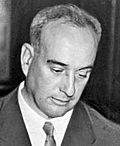 |
Robert Moses | January 18, 1934 | May 23, 1960 | 26 years, 4 months | Fiorello H. La Guardia William O'Dwyer Vincent R. Impellitteri Robert F. Wagner Jr. |
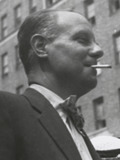 |
Newbold Morris | May 24, 1960 | January 15, 1966 | 5 years, 8 months | Robert F. Wagner Jr. |
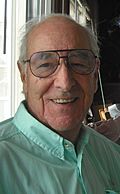 |
Thomas Hoving | January 16, 1966 | March 15, 1967 | 1 year, 3 months | John V. Lindsay |
| August Heckscher | March 16, 1967 | December 31, 1972 | 5 years, 9 months | John V. Lindsay | |
| Richard M. Clurman | January 1, 1973 | December 31, 1973 | 1 year | John V. Lindsay | |
| Edwin L. Weisl Jr. | January 1, 1974 | September 22, 1975 | 1 year, 9 months | Abraham Beame | |
| Alexander Wirin | September 23, 1975 | December 28, 1975 | 3 months | Abraham Beame | |
| Martin Lang | January 1, 1976 | June 30, 1977 | 1 year, 6 months | Abraham Beame | |
| Joseph P. Davidson | July 2, 1977 | January 20, 1978 | 6 months | Abraham Beame | |
 |
Gordon J. Davis | January 23, 1978 | April 1, 1983 | 5 years, 3 months | Ed Koch |
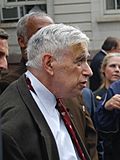 |
Henry J. Stern | April 2, 1983 | February 4, 1990 | 6 years, 10 months | Ed Koch |
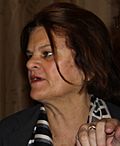 |
Elisabeth F. Gotbaum | February 5, 1990 | December 31, 1993 | 3 years, 11 months | David Dinkins |
 |
Henry J. Stern | January 1, 1994 | February 3, 2002 | 8 years, 1 month | Rudolph Giuliani |
 |
Adrian Benepe | February 4, 2002 | August 29, 2012 | 10 years, 6 months | Michael Bloomberg |
| Veronica M. White | August 30, 2012 | December 31, 2013 | 1 year, 4 months | Michael Bloomberg | |
| Liam Kavanagh | January 1, 2014 | May 12, 2014 | 5 months (Acting) | Bill de Blasio | |
| Mitchell Silver | May 12, 2014 | July 30, 2021 | 7 years, 2 months | Bill de Blasio | |
| Margaret Nelson (Acting) | August 2, 2021 | September 24, 2021 | Bill de Blasio | ||
| Gabrielle Fialkoff | September 24, 2021 | February 4, 2021 | 4 months | Bill de Blasio | |
| Liam Kavanagh | January 1, 2022 | February 4, 2022 | 1 month (Acting) | Eric Adams | |
| Susan Donoghue | February 4, 2021 | Present | Eric Adams |
See also
 In Spanish: Departamento de Parques y Recreación de la Ciudad de Nueva York para niños
In Spanish: Departamento de Parques y Recreación de la Ciudad de Nueva York para niños
 | Roy Wilkins |
 | John Lewis |
 | Linda Carol Brown |

